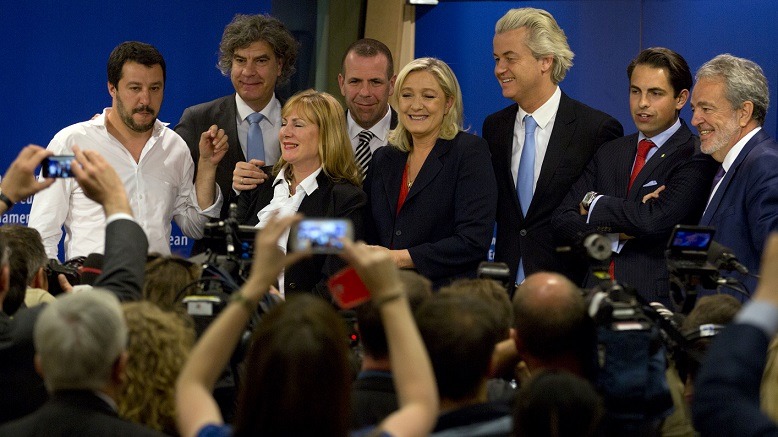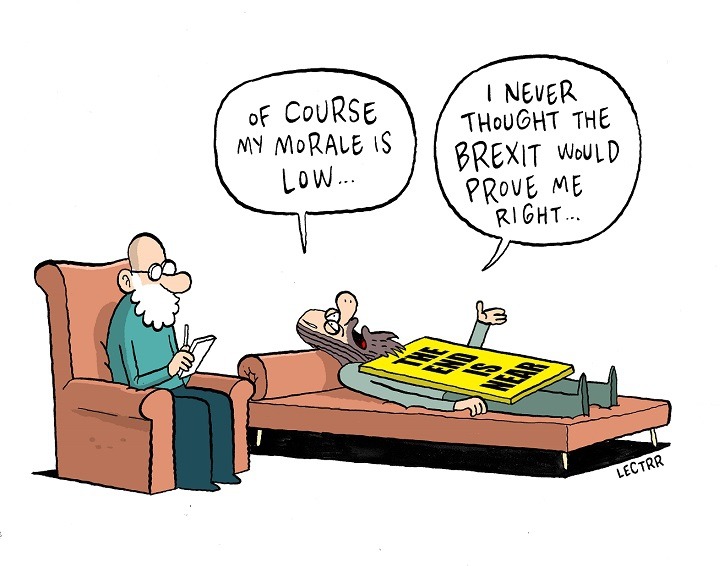In a few months, on 29 March, Britain is due to leave the European Union. For the first time ever, what had been an ever-expanding club, will lose a member. The fear in Brussels, Berlin and Paris is that other countries might follow. After all, nationalists are on a roll. Closing borders is now seen by many as the solution to every ill. Multilateral, technocratic institutions like those of the EU are seen as trampling on national sovereignty and democracy. Italians/French/Hungarians First! With further enlargement on hold for now, the EU could become an ever-shrinking club.
Further exits cannot be ruled out. Financial markets may yet force Italy out of the rickety euro, for instance. But the biggest danger is not that nationalists will lead their countries out of the EU; it is that they will first undermine and then take over the EU.
No more exits
When Britain voted in June 2016 to leave the EU, it was widely thought that its departure might start a trend. France might Frexit, the Netherlands Nexit and Italy Italeave. That fear, in turn, is a big reason why German Chancellor Angela Merkel and French President Emmanuel Macron are so intent on striking a tough bargain with the UK Prime Minister, Theresa May. To deter others, leaving the EU must be seen as making Britain worse off. You can’t have your cake and eat it.
The strategy seems to be working. The European Parliament’s latest Eurobarometer survey shows support for EU membership rising in most countries – even though voters also increasingly think the EU is going in the wrong direction. This grudging support for the EU comes out particularly clearly when voters are asked how they would vote in a putative referendum on EU membership. In Italy, where the EU is least popular, more voters (45%) think their country hasn’t benefited from EU membership than think it has (43%) – yet only 24% would vote to leave the EU in a referendum (and 44% to remain). The EU may be deeply flawed, but leaving seems worse.
No wonder nationalists are backtracking from their earlier enthusiasm for exiting the EU. In France, where 63% would vote to remain in the EU and only 17% would vote to leave, Marine Le Pen, the leader of the far-right Rassemblement National (previously Front National), has ditched her previous demand for Frexit. In the Netherlands, the hard-right populist Geert Wilders now emphasises hostility to Muslim immigrants rather than Nexit. In Italy, Matteo Salvini, the hardline interior minister who is also the leader of the far-right Lega (League), rages against the constraints of euro membership, but says Italy has no intention to leave for now.
The threat from within
It’s a good thing that leaving the EU is losing its appeal. But there are no grounds for complacency. While Britain’s chaotic attempt to exit looks to most Europeans like an act of reckless self-harm, the nationalist threat to the EU is stronger than ever. This at a time when economies are growing at a decent clip, wages are finally rising, unemployment is falling and the numbers of refugees and migrants crossing the Mediterranean have plunged. How strong might the nationalist surge be the next time a big crisis flares up?
Explicitly far-right parties are already soaring in the polls in many countries. Lega now tops the polls in Italy. In France, the Rassemblement National is neck and neck with President Macron’s La République en Marche. In Germany, the Alternative for Germany (AfD) has overtaken the Social Democratic Party (SPD) to become the second most popular party. The European Parliament elections next May are likely to see record numbers of nationalist MEPs elected.
Nationalists increasingly set the political agenda. Mainstream parties often echo their lines; some even get into bed with them. Witness Austria, whose 32-year-old prime minister Sebastian Kurz is fêted among many European conservatives for having halted the rise of the far-right. His strategy: copy many of the Freedom Party’s policies and much of its rhetoric and bring it into his coalition government. Who, then, is co-opting whom?
Kurz would doubtless point out that his coalition is explicitly pro-EU. That is true and welcome. But the nationalist threat remains real, because far-right leaders have concluded that countries don’t need to leave the EU in order to reassert their national sovereignty. In the short term, they can emulate the Hungarian and Polish governments and ignore the rules they dislike, while still reaping the benefits of EU membership. The Polish government is busy trampling on the rule of law with impunity, protected against any effective EU sanctions by the prospect of a Hungarian veto.
The Hungarian authorities’ moves are even more outrageous. They are muzzling press freedom, suborning independent institutions with corrupt cronies and banning civil-society groups from helping asylum seekers. But Prime Minister Viktor Orban is protected from censure by his Fidesz party’s membership of the European People’s Party (EPP), the ostensibly centre-right political grouping that dominates EU institutions. (Jean-Claude Juncker, Donald Tusk and Antonio Tajani, the presidents of the European Commission, Council and Parliament respectively are all from the EPP.)
Both Poland and Hungary break the EU’s fundamental rules, while pocketing EU subsidies and other EU benefits, such as the single market and free movement for their citizens. Who says you can’t have your cake and eat it?
The Trump strategy
Looking forward, far-right nationalists aim to achieve a “Europe of nations” by hijacking the EU institutions from within. Some do so as outsiders, such as Salvini, who says he might seek the presidency of the European Commission as the Spitzenkandidat (lead candidate) of the Europe of Nations and Freedom group in the European Parliament.
Others do so as insiders. Orban is the champion of what could be called the Trump strategy. Donald Trump didn’t run for president as the candidate of a third party set on displacing the Democrats and Republicans. He infiltrated and then captured the Republican Party, using it as a vehicle to get into the White House. As president, he induced Republicans to shift their positions in his direction. And he has set about undermining US democratic institutions – and destroying the liberal international order that his predecessors created – from within.

Far-right leaders at a press conference following their launch of their Europe of Nations and Freedom (ENF) political party in the European Parliament in 2015.
Likewise, the likes of Orban seek to capture first the EPP and then EU institutions and thus advance their agenda from within. Already, many EPP members take a much more hardline, Orban-like approach on migration than Orban’s nemesis Angela Merkel does.
Sceptics point out that Europe’s nationalists disagree on many things and often don’t get along. For instance, Salvini wants the EU to take more responsibility for relocating unwanted asylum seekers who arrived on Italian shores; Orban vehemently rejects an enhanced role for the EU and refuses point blank to accept more refugees. Yet each benefits from the deep divisions on migration within the EU and the EU’s inability to craft an effective common policy. Salvini can rage at the EU’s lack of solidarity for Italy, while Orban can rant against the foreign threats that Brussels wishes to impose on Hungarians. Politicians, who are set against the current EU, benefit from its dysfunction.
Addressing the status quo
European politicians need to wake up to this insidious threat and combat it far more vigorously. EU politics typically works by co-opting outsiders into a broad consensus. But sometimes the enemy within is far more dangerous. The EPP needs to inoculate itself against the far-right threat by expelling Orban’s Fidesz party. The likes of Sebastian Kurz should also end their flirtation with the far-right.
At the same time, pro-Europeans of all parties cannot simply fall back on defending the deeply flawed status quo. While nationalists’ solutions are misguided, the EU does face very real problems that need addressing, such as a dysfunctional eurozone, an unresolved crisis over refugees, a lack of democracy accountability and choice, and an inadequate defence. More broadly, many voters feel threatened by the rise of other superpowers, the disruption of digital technologies and the many threats to Europeans’ security.
To his credit, President Macron hopes to disrupt the cosy cartel in the European Parliament by running on a robustly pro-European platform that explicitly seeks to combat the likes of Orban, Salvini and Le Pen. But the danger is that Macron, who ran as an unlikely outsider to win the French presidency, is now seen as an insider who wants to defend the flawed EU status quo.
In the face of resistance in Berlin and elsewhere, he has watered down his demands for EU and eurozone reform. Will he be seen as storming the barricades, or shoring them up? To be effective, Macron would need to attack both the Merkelist status quo and the nationalists’ false prospectus. Will he dare?
By Philippe Legrain


